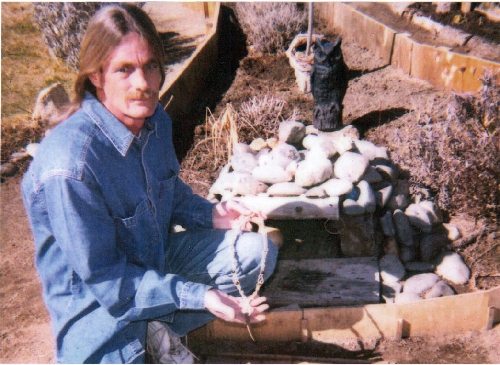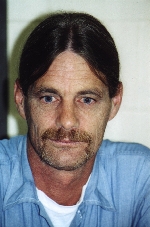Woman aims to prove innocence of brother who died in prison
Nolan Klein died in a Carson City prison on Sept. 20, 2009, more than two decades after a jury convicted him of armed robbery and rape.
But that hasn't stopped his sister from seeking justice for him.
Tonja Brown has shared her story with just about anybody who will listen.
She maintains a website, justicefornolanklein.com, and has helped write a book, "To Prove His Innocence."
She has staged public protests. And most recently, she has filed a wrongful death lawsuit against the state of Nevada.
"Had he received proper medical care, Nolan Klein would have received a new trial, and he would have been exonerated," the Carson City woman said . "There's no doubt about it."
Brown, 50, filed the federal lawsuit in October in Reno and is seeking at least $1 million in damages.
According to an amended complaint, filed in January, her brother suffered from hemochromatosis, an inherited condition that causes the body to absorb too much iron.
"As a direct result of the negligence of the Nevada Department of Corrections, Nolan Klein lost his life and died an agonizing death without treatment and proper medication," the document alleges.
Prison officials wouldn't comment, but their lawyers denied the allegation in an answer to the amended complaint.
Brown is represented by Reno lawyers Robert Hager and Treva Hearne. In her lawsuit, Brown alleges the DNA evidence that could have cleared her brother in the rape case "was compromised while in the custody of the Washoe County evidence room."
"This was a case of mistaken identity," she said.
Klein was sentenced to life in prison for robbing a Payless ShoeSource in Sparks and raping the store manager at knifepoint. The crime occurred in May 1988.
Brown said Klein was living with her family in Carson City at the time, and his girlfriend was living in Reno with the couple's infant son.
If Brown can easily recite all the details of Klein's criminal case, so can Washoe County District Attorney Richard Gammick, who bristled when asked about it.
"I've been listening to her for 23 years," Gammick said.
He then tersely recounted the history of the case, including all of Klein's failed appeals and requests for parole.
"There is no doubt whatsoever that he was guilty," Gammick said.
After becoming district attorney in 1995, Gammick said, he researched all the issues Brown had raised and "told her none of them held water."
Brown chooses to believe in a "mass conspiracy," the district attorney said.
When asked about Brown's claims regarding DNA evidence in the case, Gammick said investigators had no DNA evidence to test. A cigarette butt collected as evidence "was never tied to the scene," he said.
An attempt to ask follow-up questions was greeted with a dial tone. Gammick did not respond to a message left at his office after the call was disconnected.
According to Brown's lawsuit, Klein "was condemned to death by incarceration because of the policy and practice of the Nevada State Department of Corrections in operating its prison facility and in punishing those inmates who are successful at litigation."
Klein attended paralegal training while incarcerated and filed several complaints against the correctional system and the city of Sparks, according to Brown's lawsuit, which said that some of his litigation succeeded.
Brown's lawsuit further alleges that the state "refuses to provide reasonable medical care to its inmates proven by a recent history of unnatural deaths and suffering by inmates within the Nevada prison system litigated by the American Civil Liberties Union."
The ACLU of Nevada filed a class-action lawsuit against the state in 2008 after the organization's doctor, William Noel, met with and studied the records of 35 inmates at Ely State Prison.
Noel called the care for inmates "the most shocking and callous disregard for human life and human suffering" he had encountered in the medical profession.
The ACLU of Nevada received $325,000 in legal fees when the case settled last year.
This month, the organization released a 68-page report titled "Not Fit For Human Consumption or Habitation: Nevada's Prisons in Crisis."
The report claims overcrowding and understaffing are preventing Nevada prisons from meeting the basic human needs of those they incarcerate.
Corrections Department officials disputed the report's findings.
Klein died at the medical center in the Northern Nevada Correctional Center. He was 54.
"His last dying wish was to have a private autopsy performed and to preserve his DNA for future DNA testing," said Brown, who said she complied with his wish.
According to her lawsuit, Klein "died from respiratory arrest, hepatic Coma, Cirrhosis, Hepatitis C, all aggravated and made critical by the failure to treat his Hemochromatosis and hypertensive and arteriosclerotic cardiovascular disease."
The document alleges Corrections Department officials had known of Klein's medical condition for more than 10 years.
All of the defendants had "malice and disdain" for Klein's litigation and for Brown's protests "and intentionally, vindictively or with reckless disregard, failed to provide medical treatment to Mr. Klein to save his life," Brown's lawsuit alleges.
Brown said the wrongful death case will allow her to retry her brother's rape case.
"There will be no settling this case," she said.
Contact reporter Carri Geer Thevenot at cgeer@reviewjournal.com or 702-384-8710.























